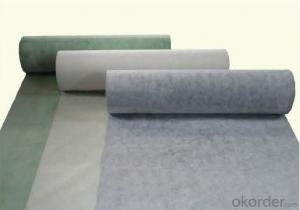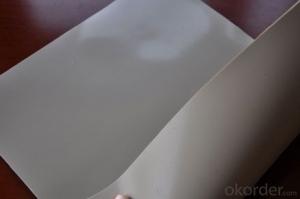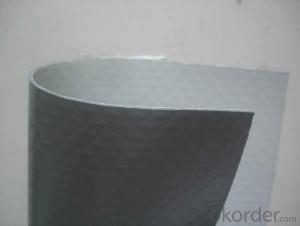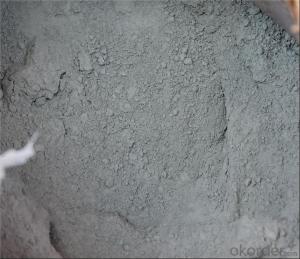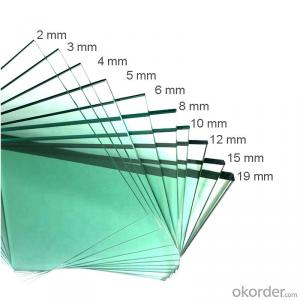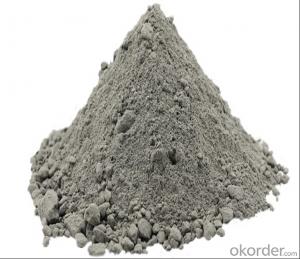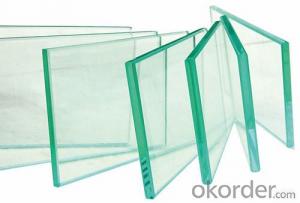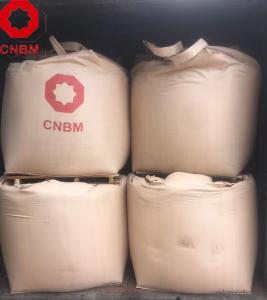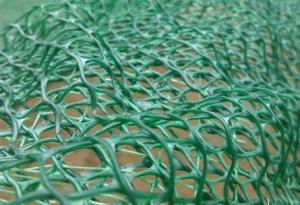Polyvinyl Chloride Coated Waterproof Membrane
- Loading Port:
- China main port
- Payment Terms:
- TT OR LC
- Min Order Qty:
- 5000 m²
- Supply Capability:
- 100000 m²/month
OKorder Service Pledge
OKorder Financial Service
You Might Also Like
Specification of PVC Waterproofing Membrane
Length | 20m/roll or customized |
Width | 2.05m |
Thickness | 1.2mm; 1.5mm; 2.0mm |
Type | Homogeneous, Reinforced, Fabric back |
If Exposed | Exposed and Non-exposed |
Color | White, Grey or customized |
Introduction of PVC Waterproofing Membrane
Polyvinyl Chloride (PVC) waterproof membrane is a new polymer waterproof membrane which is made from polyvinyl chloride resin, and mixed with plasticizer, filler, antioxygen, ultraviolet absorber and other auxiliaries.
Advantages of PVC Waterproofing Membrane
1. Lower cost for installation and maintaining than other material
2. Easy installation and good connection
(Short installation period, easy to be connected with other buildings)
3. Water-proof, anti-leakage and anti-UV
4. Long time-lasting for use, anti-aging and strong self-clean ability
5. Good weather resistance and high tearing strength
(Resist against 12 grade typhoon)
6. For different weight, width, colours and thickness, we can arrange as special requirement.
Used for the tent of outdoor exhibition hall and canopy of overpass.
Character: waterproof, PVC coated, easy installation
FAQ of PVC Waterproofing Membrane
a.Can we get some samples before place order?
Answer: We can send the free samples to you by freight collect.
b.How many years can your PVC membrane guarantee?
Answer: We will guarantee the quality for 5 years at least.
c.Which countries you ever export the product?
Answer: We export the PVC membrane to South Africa, Middle east and even European countries.
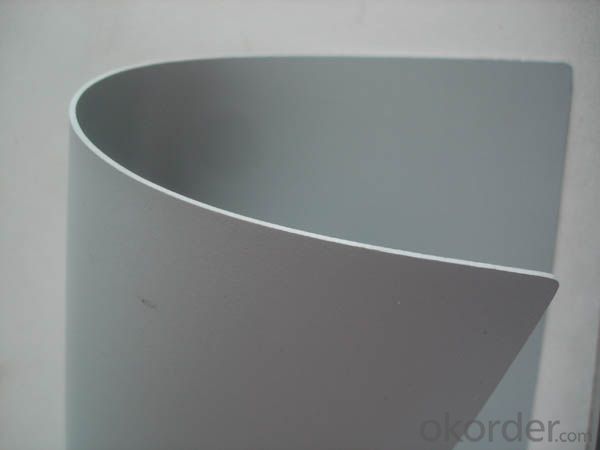
- Q:Can a waterproofing membrane be used in showers and wet areas?
- Certainly, one can indeed utilize a waterproofing membrane in showers and areas prone to moisture. In actuality, it is highly advisable to incorporate a waterproofing membrane in these regions as a means of averting water harm and leaks. The waterproofing membrane functions as a barrier between the tile or flooring and the underlying floor, guaranteeing containment and channeling of any water that infiltrates the surface towards the drains. This ensures preservation of the foundational structure by preventing moisture-induced damage like decay or mold proliferation. Moreover, a waterproofing membrane also serves to mitigate the risk of water seepage into nearby spaces and inducing harm to adjacent walls or floors. It is of utmost importance to ensure accurate installation of the waterproofing membrane, diligently sealing all seams, corners, and penetrations to achieve the desired level of waterproofing.
- Q:Can a waterproofing membrane be used for a stadium seating area?
- Yes, a waterproofing membrane can be used for a stadium seating area. Waterproofing membranes are designed to provide a barrier against water penetration and are commonly used in various construction projects, including stadiums. By applying a waterproofing membrane to the seating area, it helps prevent water damage, mold growth, and deterioration caused by moisture. This ensures the longevity and durability of the seating area, protecting it from potential water-related issues.
- Q:Can a waterproofing membrane be used on glass block surfaces?
- Yes, a waterproofing membrane can be used on glass block surfaces. Glass block surfaces are often used in areas such as bathrooms or kitchens where waterproofing is essential to prevent water damage. Applying a waterproofing membrane helps to create a barrier that prevents water from penetrating the glass blocks, protecting the underlying structures and materials. The membrane is typically applied to the exterior side of the glass block surface, ensuring that any water that comes into contact with the surface is directed away and does not seep through. It is important to choose a waterproofing membrane that is specifically designed for use on glass block surfaces to ensure proper adhesion and long-lasting protection.
- Q:Can a waterproofing membrane be installed in areas with high humidity?
- Installing a waterproofing membrane is possible in areas with high humidity. In fact, high humidity can contribute to the necessity of waterproofing due to the possibility of moisture accumulation and potential water damage. Regardless of the humidity levels, waterproofing membranes are designed to establish a barrier against water infiltration. Nonetheless, it is crucial to guarantee the correct installation and sealing of the membrane to prevent any moisture seepage. Moreover, in areas with high humidity, it might be essential to adopt additional measures like utilizing moisture barriers or dehumidifiers to provide further protection against potential water damage.
- Q:Can a waterproofing membrane be used for an industrial facility floor?
- Yes, a waterproofing membrane can be used for an industrial facility floor.
- Q:Are waterproofing membranes easy to install?
- Yes, waterproofing membranes are generally easy to install. They come in various forms such as sheets, rolls, or liquid coatings, making them adaptable to different surfaces and applications. The installation process typically involves cleaning and preparing the surface, applying the membrane, and ensuring a proper seal. While some technical knowledge and tools may be required, manufacturers often provide detailed instructions and guidelines for installation, making it easier for both professionals and DIY enthusiasts. Additionally, advancements in technology have led to the development of self-adhesive membranes, which further simplify the installation process. Overall, with the right preparation and following the correct installation procedures, waterproofing membranes can be installed with relative ease.
- Q:Can a waterproofing membrane be used on roofs with skylights?
- Certainly, roofs with skylights can benefit from the use of a waterproofing membrane. It is strongly advised to employ a waterproofing membrane around skylights in order to prevent water infiltration or leakage. Skylights have the potential to become weak points in a roof system, as they form openings that can let water seep through if not adequately sealed. The application of a waterproofing membrane around the skylights serves to establish a watertight barrier that safeguards the roof from any potential leaks. Furthermore, a waterproofing membrane also offers added protection against external factors such as UV rays and changes in temperature, thereby extending the lifespan of both the skylights and the roof itself.
- Q:Can a waterproofing membrane be used in conjunction with concrete repair or restoration?
- Yes, a waterproofing membrane can be used in conjunction with concrete repair or restoration. The membrane acts as an additional protective layer to prevent water penetration and enhance the durability and longevity of the repaired or restored concrete structure.
- Q:Can a waterproofing membrane be used on swimming pool decks?
- Indeed, swimming pool decks can benefit from the use of a waterproofing membrane. The purpose of these membranes is to effectively block water infiltration, which makes them particularly suitable for safeguarding areas that are constantly exposed to moisture, like swimming pool decks. Typically, these membranes are applied directly onto the deck's surface, creating an impermeable and long-lasting layer. This ensures that water does not permeate the deck, thus averting potential harm caused by dampness, such as cracks, the growth of mold, or structural decline. Furthermore, waterproofing membranes offer additional advantages, including prolonging the lifespan of the deck and enhancing its overall aesthetic appeal.
- Q:Can waterproofing membranes be used on concrete planters?
- Concrete planters can indeed benefit from the use of waterproofing membranes. These membranes are specifically designed to create a strong barrier against water, effectively preventing any water from penetrating the concrete and causing harm. By applying a waterproofing membrane to a concrete planter, it guarantees that the planter will remain completely watertight, thus avoiding any potential leaks or damage to the surrounding area. This is particularly advantageous for planters located indoors or in areas where water leakage could lead to structural harm or messy situations. Moreover, waterproofing membranes also provide an additional advantage by safeguarding the concrete against freeze-thaw cycles, which can ultimately result in cracks and deterioration over time. Overall, the utilization of waterproofing membranes on concrete planters enables an extended lifespan and the preservation of their functionality for an extended duration.
1. Manufacturer Overview |
|
|---|---|
| Location | |
| Year Established | |
| Annual Output Value | |
| Main Markets | |
| Company Certifications | |
2. Manufacturer Certificates |
|
|---|---|
| a) Certification Name | |
| Range | |
| Reference | |
| Validity Period | |
3. Manufacturer Capability |
|
|---|---|
| a)Trade Capacity | |
| Nearest Port | |
| Export Percentage | |
| No.of Employees in Trade Department | |
| Language Spoken: | |
| b)Factory Information | |
| Factory Size: | |
| No. of Production Lines | |
| Contract Manufacturing | |
| Product Price Range | |
Send your message to us
Polyvinyl Chloride Coated Waterproof Membrane
- Loading Port:
- China main port
- Payment Terms:
- TT OR LC
- Min Order Qty:
- 5000 m²
- Supply Capability:
- 100000 m²/month
OKorder Service Pledge
OKorder Financial Service
Similar products
New products
Hot products
Related keywords
